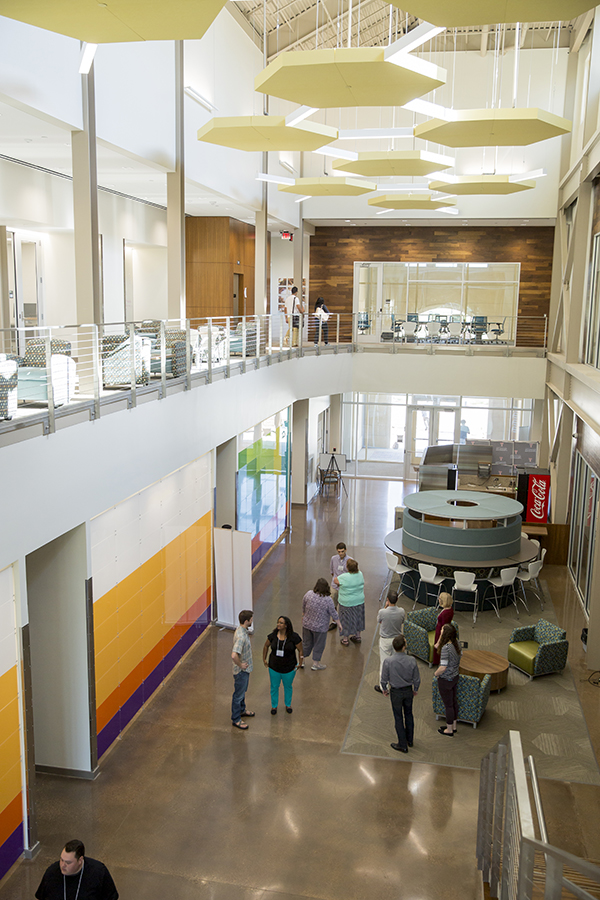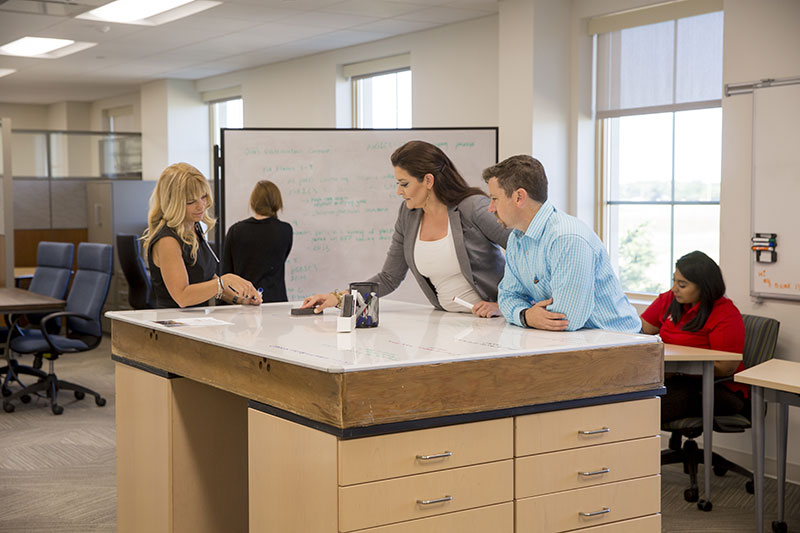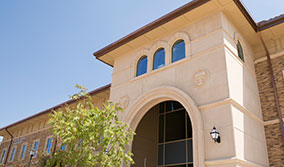Innovation Hub at Research Park Awarded LEED Silver Certification
LEED® certification signifies the recognition of Texas Tech University as a leader in the green building movement.
 Opened in August 2015, the facility promotes collaborative research and entrepreneurship
between the university and the business community.
Opened in August 2015, the facility promotes collaborative research and entrepreneurship
between the university and the business community. Texas Tech University and the Texas Tech University System officials announced today (Aug. 22) the Innovation Hub at Research Park has been awarded Leadership in Energy and Environmental Design (LEED®) Silver certification, established by the U.S. Green Building Council (USGBC) and verified by the Green Building Certification Institute.
The LEED® Green Building Rating System is the national benchmark for the design, construction and operation of high-performance green buildings.
“Receiving the LEED® Silver certification for the Innovation Hub at Research Park project is another landmark in fostering sustainability across the Texas Tech University System,” said Michael Molina, vice chancellor for Facilities Planning & Construction. “It always is our goal to construct buildings to LEED® standards, and this recognition affirms our exemplary efforts.”
LEED® certification signifies the recognition of Texas Tech University as a leader in the green building movement. The research building achieved Silver certification for its environmentally conscious, sustainable construction in energy use, lighting, water and material use.
By using less energy and water, LEED® certified buildings save money for families, businesses and taxpayers; reduce greenhouse emissions; and contribute to a healthier environment for residents, workers and the larger community.
“The meaning of LEED® certification is at the very essence of why we developed the Innovation Hub at Research Park at Texas Tech University,” said Lawrence Schovanec, president of Texas Tech University. “This building reflects a forward thinking attitude and houses a productive environment for collaborative and innovative decisions that will affect our global future.”
Texas Tech University’s Innovation Hub at Research Park officially opened on Aug. 5, 2015. Near the corner of Fourth Street and Quaker Avenue, the 40,000-square-foot facility is designed as a resource for faculty and students of both Texas Tech University and Texas Tech University Health Sciences Center, as well as business communities to promote entrepreneurialism and research efforts in numerous areas.
The building is engineered to minimize negative environmental impacts and focuses on resource savings. It is designed to reduce indoor water use by 43 percent compared to a conventional building, and more than 44 percent of electrical and natural gas energy use has been reduced from the baseline use. Additionally, more than 35 percent of the building materials were extracted, harvested and manufactured within a 500-mile radius, and more than half of the debris generated during construction for the project has been recycled.
 The Innovation Hub at Research Park (the "Hub") is the first of five facilities dedicated
to house and provide access to resources to students, faculty, alumni and entrepreneurs.
The Innovation Hub at Research Park (the "Hub") is the first of five facilities dedicated
to house and provide access to resources to students, faculty, alumni and entrepreneurs. “I am grateful to our talented team and many partners for their outstanding work on the project and diligence to this important priority,” Molina said. “This certification wouldn’t have been possible without Kirksey Architecture, Hill & Wilkinson, Chambers Engineering and Alderson & Associates, as well as countless other designers, engineers and tradesman.”
The building site and landscaping for the project also were noted for sustainability efforts and careful design. An efficient irrigation system and native, drought-tolerant plant selections were used to reduce irrigated potable water by 60 percent.
The Innovation Hub at Research Park is the second building on the Texas Tech University campus to achieve LEED® certification, joining the Rawls College of Business, which was Gold certified in 2012.
Under the leadership of Molina, Facilities Planning & Construction manages new construction and renovation projects valued over $2 million for the Texas Tech University System and its four universities. The department has an annual project portfolio averaging approximately $250 million. Additionally, Facilities Planning & Construction oversees campus master planning, facility and land development, public art and vendor information for all components.
U.S. Green Building Council
The Washington, D.C.-based USGBC is committed to a prosperous and sustainable future
for the nation through cost-efficient and energy-saving green buildings. With a community
comprising 80 local affiliates, more than 18,000 member companies and organizations,
and more than 167,000 LEED® Professional Credential holders, USGBC is the driving
force of an industry that is projected to contribute $29.8 billion to GDP by 2018.
USGBC leads an unlikely diverse constituency of builders and environmentalists, corporations
and nonprofit organizations, elected officials and concerned citizens, and teachers
and students.
LEED®
The U.S. Green Building Council’s LEED® green building certification system is the
foremost program for the design, construction and operation of green buildings. More
than 100,000 projects are currently participating in the LEED® rating systems, comprising
more than 8 billion square feet of construction space in all 50 states and 114 countries.
About the Texas Tech University System
The Texas Tech University System is one of the top public university systems in Texas
and the nation, consisting of four component institutions – Texas Tech University,
Texas Tech University Health Sciences Center, Angelo State University and Texas Tech
University Health Sciences Center El Paso – and operating at more than a dozen academic
sites and centers. Headquartered in Lubbock, Texas, the Texas Tech University System
has an annual operating budget of nearly $2 billion and approximately 19,000 employees
focused on advancing higher education, health care, research and outreach.
In 2015, the Texas Tech University System’s endowment exceeded $1.1 billion, total research expenditures were more than $215 million and total enrollment was approximately 50,000 students. Whether it’s contributing billions of dollars annually in economic impact or being the only system in Texas to house an academic institution, law school and health-related institution at the same location, the Texas Tech University System continues to prove that anything is possible.


 This 40,000 square foot facility is designed to become a resource for the faculty
and students of both Texas Tech University and the Texas Tech University Health Sciences
Center as well as community members interested in launching new ventures.
This 40,000 square foot facility is designed to become a resource for the faculty
and students of both Texas Tech University and the Texas Tech University Health Sciences
Center as well as community members interested in launching new ventures.